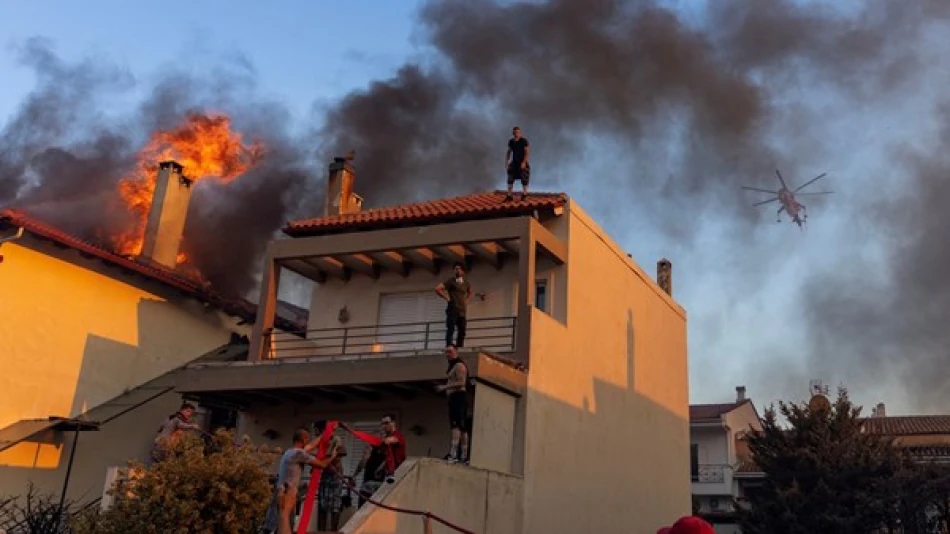
Greece Evacuates Villages as Wildfires Rage Amid Scorching Heatwave
Greece Battles Third Heat Wave as Wildfires Force Mass Evacuations Near Athens
Greece is confronting a dangerous escalation in wildfire activity as temperatures soar to 44°C (111°F) during the country's third major heat wave this summer. Multiple blazes near Athens and across the mainland have triggered village evacuations and industrial facility threats, highlighting the Mediterranean nation's growing vulnerability to climate-driven disasters that increasingly define its summer seasons.
Critical Situation Near the Capital
The most immediate threat centers on Drosopigi village, located just 25 kilometers north of Athens, where explosions have rocked industrial facilities containing flammable materials. Massive smoke clouds have engulfed the area as firefighters deploy 26 vehicles and two aircraft in desperate containment efforts.
The proximity to Athens makes this blaze particularly concerning for Greece's economic hub, home to nearly four million people. Authorities have already ordered evacuations from nearby Krioneri village, directing residents toward the capital as a precautionary measure.
Industrial Risk Amplifies Danger
The presence of industrial facilities with combustible materials near Drosopigi represents a compounding risk factor that distinguishes this fire from typical woodland blazes. Such scenarios have historically led to more severe environmental and economic consequences, as seen in previous industrial fire incidents across southern Europe.
Island Communities Under Siege
On Evia island, Greece's second-largest landmass, 115 firefighters supported by 24 vehicles, six planes, and seven helicopters are struggling against powerful winds that continue hampering suppression efforts. Residents in the Triada area have been placed on high alert for potential evacuation.
This latest Evia fire continues a troubling pattern for the island, which suffered devastating blazes in previous years that destroyed thousands of hectares of forest and agricultural land. The recurring nature of these fires suggests a structural challenge in Greece's fire management capabilities.
Multiple Evacuation Zones Expand
The crisis extends beyond the mainland, with Kythira island seeing complete evacuations of three villages: Aroniadika, Pitsinades, and Arioi. In Messinia region west of Athens, authorities have similarly ordered departures from Krioneri and Silas villages.
Climate Pattern Reveals Deeper Challenges
This marks Greece's third significant heat wave in a single summer season, indicating an intensification of extreme weather patterns that have become increasingly common across the Mediterranean basin. The combination of record temperatures, strong winds, and dry conditions creates what fire experts call a "perfect storm" for wildfire propagation.
Greece's fire season now effectively extends from May through October, compared to the traditional July-August peak period of previous decades. This extension strains resources and requires sustained readiness that challenges the country's emergency response infrastructure.
Economic and Tourism Implications
The timing during peak tourism season compounds the economic impact, as Greece relies heavily on summer visitors who contribute approximately 20% of the country's GDP. Widespread evacuations and smoke-filled skies near major tourist destinations could influence visitor confidence and booking patterns for the remainder of the season.
Insurance costs for Greek property owners and businesses continue rising as wildfire frequency increases, creating long-term economic pressures that extend far beyond immediate fire suppression costs.
Regional Context and Future Outlook
Greece's current situation mirrors broader Mediterranean challenges, with countries like Spain, Italy, and southern France experiencing similar fire intensity and frequency increases. However, Greece's combination of mountainous terrain, island geography, and limited water resources creates unique vulnerabilities.
The country's investment in firefighting aircraft and early warning systems has improved response capabilities, yet the sheer scale and frequency of incidents increasingly overwhelm available resources. This summer's pattern suggests Greece may need to fundamentally reassess its approach to fire prevention and community planning in high-risk areas.
The current crisis underscores how climate adaptation has become not just an environmental issue, but a core economic and security challenge for Mediterranean nations facing an uncertain future of intensifying extreme weather events.
Most Viewed News

 Layla Al Mansoori
Layla Al Mansoori






